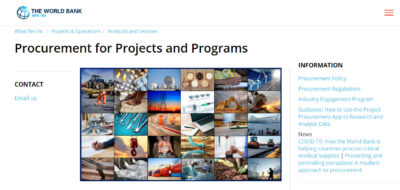The 2012 evaluation, “Results and Performance of the World Bank Group,” found that it continues to fall short of its goals, mainly because it needs to be more realistic and sensitive to the local “political economy”
The World Bank’s Independent Evaluation Group examined the effectiveness of its activities. Here are excerpts from its recent annual report, along with our take on what it means:
“Although country programs have met their objectives more often than not, the record falls short of the 70 percent performance standard set in the World Bank’s Corporate Scorecard. There is little disagreement on the need to strengthen realism and results frameworks for country programs, a finding supported by recent IEG country program evaluations and an evaluation of the Bank’s matrix system. Realistic country programs typically show an understanding of the country’s political economy and are characterized by selectivity and focus on areas in which the Bank can best add value.”
Upstream’s translation: The World Bank continues to neglect the needs of the people it is supposed to serve, operates in an imagined environment, and leaves out stuff it doesn’t like – like human rights abuse and oppression.
“In infrastructure, agriculture, and beyond, evaluations regularly stress the relevance of high-quality project design and effective progress monitoring to project outcomes. They repeatedly refer to overambitious project design, inadequate consultation with stakeholders, insufficient candor during supervision, and failure to follow up on problems identified during supervision missions as reasons for less-than-satisfactory achievements.”
Upstream’s translation: When you don’t include the people affected, things don’t work.
“Human development was the only area in which the share of projects rated moderately satisfactory or better in development outcome ratings improved between FY06–08 and FY09–11. Although the change is not statistically significant, it is a positive development for the sectors that can be examined further.”
“Since the mid-2000s, ratings for human development operations have been poorer than those in other areas.”
Upstream’s translation: The economy, not the people, is still the point of World Bank programs.
“Dialogue with a range of stakeholders is important in driving the demand for change. An in-depth understanding of political economy and associated risks is key to assessing ownership of and opposition to a particular intervention, as well as the likelihood that it will succeed and its eventual impact. More effective management of governance and anticorruption risks calls for greater consistency in the Bank’s approach to setting risk tolerances across client countries as well as a harmonized control framework across Bank financing instruments.”
Upstream’s translation: Another way of saying that the people affected don’t have a say, their realities aren’t taken seriously, and the World Bank’s Washington-based technocrats need to get real.
What wasn’t in the report? No mention of these words or phrases: human rights, rights-based development, consent, empowerment.


